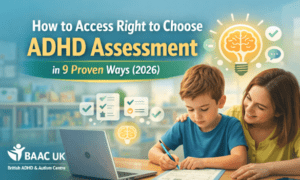When a child struggles with learning, it’s natural for parents and educators to feel concerned. Questions about what’s normal, what might be a sign of a deeper issue, and how to offer the right support often led families to consider a formal evaluation. A learning disorder evaluation isn’t just a test it’s a structured, supportive process designed to better understand how a child thinks, learns, and processes information. This comprehensive guide walks through each stage of that journey.
Recognizing the Signs: Why Evaluations Are Initiated
The process typically begins when noticeable learning difficulties or behavioral patterns emerge. These can be seen at home, in the classroom, or in social settings. A teacher might observe that a student is falling behind academically, struggling with attention, or displaying difficulty following instructions. Parents may notice issues with reading, writing, focus, or memory during homework or conversations.
When such signs persist and begin to interfere with the child’s educational progress or self-confidence, an evaluation is often recommended to determine if a learning disorder or another underlying challenge is present.
Professionals Involved in the Evaluation Process
Several types of trained professionals can conduct learning evaluations. Within school settings, evaluations are typically led by school psychologists, who work alongside educators and special education teams. In a private setting, assessments may be handled by licensed professionals such as Neuropsychologists, clinical psychologists, or educational specialists.
In some cases, collaboration between the school and an outside expert becomes necessary especially if the evaluation needs to delve deeper than the school is equipped to handle. A Child Psychologist with expertise in cognitive development and educational psychology can offer valuable insights into how a child’s emotional and mental development intersects with their learning capabilities.
Key Components of a Learning Disorder Evaluation
A full learning evaluation includes multiple components that assess a wide range of skills and behaviors. The goal is to gather a comprehensive picture of the child’s strengths and challenges across cognitive, academic, and emotional domains.
1. Cognitive Testing
This segment measures core intellectual functions such as verbal reasoning, non-verbal problem-solving, working memory, and processing speed. These areas offer insight into how a child takes in, processes, and responds to information.
2. Academic Achievement Testing
This portion of the evaluation focuses on fundamental academic skills reading fluency, reading comprehension, spelling, writing mechanics, and mathematical reasoning. It helps determine whether academic performance aligns with age and grade expectations.
3. Behavioral and Emotional Observations
Observing a child during testing and reviewing behaviorchecklists filled out by parents and teachers helps evaluators understand the child’s emotional landscape, social interactions, and behavior regulation.
4. Executive Function and Attention Assessments
Evaluations may include tasks and questionnaires that assess organizational skills, focus, planning ability, and impulse control, which are often impacted in cases of ADHD or executive functioning difficulties.
Timeline and Structure: What to Expect
The evaluation is rarely completed in a single day. Depending on the child’s age, attention span, and emotional readiness, testing may be broken into two or three sessions, each lasting a couple of hours. This structure helps keep the child engaged and minimizes fatigue, which could otherwise impact the accuracy of the results.
After all testing is completed, the evaluator reviews and interprets the findings, which are then compiled into a detailed report. This report typically includes scores, observational insights, diagnostic impressions, and practical recommendations for both home and school environments. The entire process from initial intake to final report usually takes between two to four weeks.
When Is a Neuropsychological Evaluation Necessary?
In certain cases, a standard educational evaluation may not provide a complete understanding of a child’s learning profile. This is especially true when multiple concerns overlap, such as learning challenges coupled with behavioral or emotional difficulties. A neuropsychological evaluation goes further, offering a deeper analysis of brain-behavior relationships. It is often recommended for children with complex developmental histories, medical concerns, or neurological issues.
Why Sessions Are Split into Sections
Splitting the evaluation into multiple sections isn’t just a convenience—it’s an intentional strategy to improve the quality of the results. Young children may not have the stamina to complete several hours of testing in one sitting. Breaking it up allows for a more accurate and less stressful assessment experience.
Each session typically focuses on different skill sets. For instance, cognitive tests might be done in one session, academic tests in another, and emotional or behavioralassessments later.
Ensuring a Supportive, Age-Appropriate Experience
Professionals conducting evaluations are trained to create a safe, child cantered environment. This includes using language appropriate for the child’s age, offering reassurance, and pacing activities based on the child’s responses and energy level. Many evaluators also include breaks, short conversations, or interactive games to help ease the child into the process.
The goal is to minimize anxiety and ensure that the child feels comfortable and confident throughout. A well-managed evaluation setting can become a positive and empowering experience for children.
Can Testing Be Enjoyable?
Surprisingly, yes. Many children enjoy parts of the testing process, especially tasks that involve puzzles, memory games, pattern recognition, or computer-based challenges. By turning the evaluation into a series of engaging activities rather than rigid tests, evaluators help children stay focused and even have fun along the way.
Areas of Focus: What Skills Are Being Measured?
The evaluation looks at a range of specific abilities and academic competencies:
By evaluating these areas, the results help determine whether the child meets the criteria for a learning disorder, such as dyslexia, dysgraphia, or dyscalculia, or whether another condition is impacting their academic performance.
Why Schools Refer ADHD Concerns to Paediatricians
Schools are limited in their ability to make medical diagnoses. While school staff can recognize attention-related concerns and support students through behavioral interventions or academic accommodations, an actual diagnosis of ADHD must come from a healthcare provider.
That’s why, when attention issues are suspected, educators often recommend that families consult with a pediatrician or a licensed Child Psychologist for further evaluation. Medical professionals can then consider a full range of factors, including physical health, developmental history, and family dynamics, to determine whether ADHD or another condition is present.
Choosing the Right Evaluator for Your Child
Finding the right professional is a critical step. For those pursuing a Learning Disability Evaluation privately, it’s important to research evaluators based on their qualifications, experience with children, and specialization in learning or developmental disorders. Parents should look for providers who communicate clearly, offer thorough reports, and provide actionable recommendations.
Referrals from your child’s school, pediatrician, or other parents can be helpful starting points. It’s also worth reviewing credentials and asking specific questions about the types of assessments they use and their approach to working with children.
Final Thoughts
A learning disorder evaluation is more than a diagnostic toolit’s an opportunity to truly understand how your child learns and thinks. By identifying strengths and challenges, it lays the groundwork for targeted support and long-term academic success. Whether conducted through a school or privately, the process is a crucial first step in empowering children to thrive in and out of the classroom.
If you’re considering an evaluation, know that you’re not aloneand that this journey can lead to greater confidence, understanding, and the right support for your child’s unique learning journey.



































